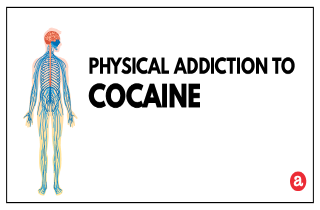Here, we discuss physical addiction to cocaine and its treatment. Questions, personal thoughts, or experiences overcoming cocaine use are welcomed at the end. We respond to all legitimate comments with a personal and prompt reply.
Physical dependence on cocaine
There is a difference between physical drug dependence and addiction. While dependence is closely related to the need of the body for more cocaine, cocaine’s addictive quality is related to the mind set of the user. Basically, addiction creates cravings, driving drug users to use cocaine for its “positive” effects, ignoring negative or adverse side effects. However, physical dependence on cocaine does not indicate addiction by default.
Cocaine is psychologically addictive, particularly with heavy or frequent use, and possibly physically addictive, as well. However, when it comes to cocaine …it is extremely difficult to be able to control and to differ those two processes. The difference between the short “rush” and the long-lasting “crash” is too big, so cocaine users often go for the next dose with no second thoughts.
Physical signs of addiction to cocaine
Physical signs of addiction to cocaine can include withdrawal symptoms which occur during times of lowered dosage or cessation of use. Symptoms of cocaine withdrawal often are latent, unlike the vomiting and shaking that accompanies the withdrawal from heroin or alcohol. Instead, symptoms tend to by psychological in nature and include agitation, anxiety, distress, inability to focus on divided attention tasks, inability to follow directions, confusion, hostility, time distortion, and poor balance and coordination.Withdrawal symptoms from cocaine can typically last from 1-3 weeks.
Here is a list of the most common signs that indicate you are going through withdrawal period.
- agitation and restless behavior
- alternating low and high drug craving
- depression mood and apathy
- disorientation
- fatigue
- hunger
- increased appetite
- irritability
- long periods of sleep with unpleasant dreams
- low to high anxiety
- paranoia
The craving and depression you experience during cocaine withdrawal can last for months following cessation of long-term heavy use. Withdrawal symptoms may also be associated with suicidal thoughts in some people.
Treating physical symptoms of addiction to cocaine
At least half of all people addicted to cocaine also have been diagnosed with other mental disorders, particularly depression and attention-deficit disorder. These conditions should be suspected and treated by a professional, who understands cocaine addiction treatments. All prescription drug use should be monitored carefully in patients who abuse substances.
Symptoms of cocaine dependence or addiction usually disappear over time. Presently, there are no effective medications for reducing craving, although some are being tested. Some studies have reported that medications such as amantadine and bromocriptine may help to reduce patient’s craving, increase energy, and normalize sleep, particularly among those with the most seriously addicted.
People who go through cocaine withdrawal will often use alcohol, sedatives, hypnotics, or anti-anxiety medications such as diazepam to treat their symptoms. Use of these drugs is not recommended because it simply shifts addiction from one substance to another.
Physical cocaine addiction questions
We hope that you got to know more about physical addiction to cocaine. If there is a topic that was not covered or you have a question concerning cocaine addiction, you are more than welcome to ask the question here. We will be happy to try to provide you with a personal and accurate answer.









Related Posts